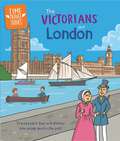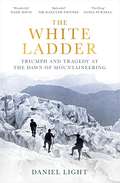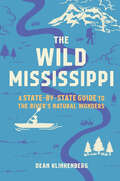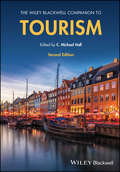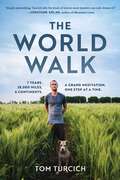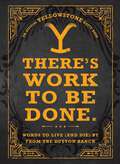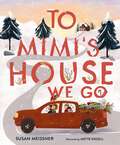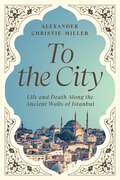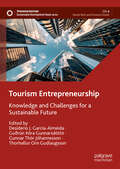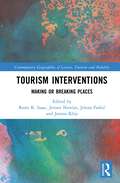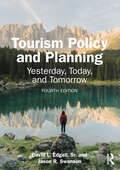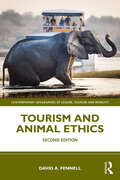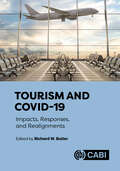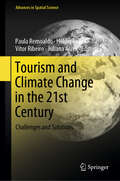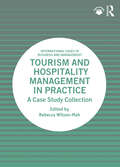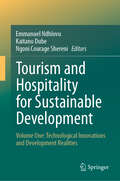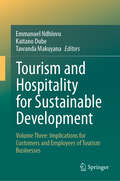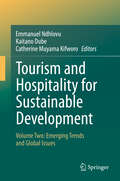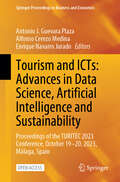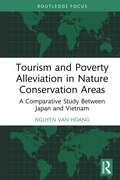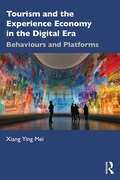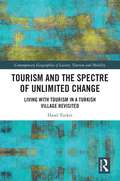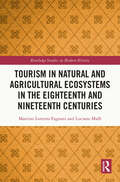- Table View
- List View
The Unofficial Disney Parks Holidays Cookbook: From Strawberry Red Velvet Whoopie Pies to Christmas Wreath Doughnuts, 100 Magical Dishes Inspired by Disney's Holiday Celebrations and Events (Unofficial Cookbook Gift Series)
by Ashley CraftThe magic of the holidays meets the magic of Disney right in your very own kitchen with these 100 recipes inspired by Walt Disney World and Disneyland&’s hottest holiday celebrations, festivals, and special events all year long.Bring the magic of Disney&’s holiday celebrations straight to your kitchen with The Unofficial Disney Parks Holidays Cookbook! From festivals and holidays to other special events throughout the year, this book features 100 recipes for the best food items Disney&’s annual celebrations have to offer. You&’ll learn to make: -Valentine Swirl Dole Whip from The Tropical Hideaway for Valentine&’s Day -Frozen Apple Cider from ABC Commissary at Halloween -The Patriots Platter at Liberty Tree Tavern for a classic Thanksgiving meal -The Lock Shock and Barrel Sundae from Auntie Gravity&’s at Christmas -And much more! Perfect for everyone from Disney experts who miss those familiar flavors in between trips to fans who have never visited the Parks but still have Mickey&’s Very Merry Christmas Party on their bucket list, The Unofficial Disney Parks Holidays Cookbook has all the recipes you need to make a celebratory dish worthy of the Mouse himself.
The Victorians and London (Time Travel Guides #7)
by Tim CookeStep back in time to discover life in London during the reign of Queen Victoria with this handy time travel guidebookTravel back in time to Victorian London and find out all about life and culture there. Get ready to visit a cotton mill, drink coffee in one of new coffee houses and watch the Changing of the Guard at Buckingham Palace! Like modern travel guides, the books in this series highlight must-see features and explain local culture. Each highlighted destination contains an explanation of what took part in these areas, as well as a look at important artefacts found there providing a bigger picture of life in the past. Typical travel guide notes include, 'best time to visit', 'what to eat' and 'where to stay'. Perfect for the KS2 history curriculum, and for readers aged 7 and up.Contents:LondonPutting London on the mapOut and aboutVictorian homesChristmasThe East EndStroll along the riverVictorian childrenHealth and medicineBooming BritainTime offBuckingham PalaceVisit quick!GlossaryFurther informationIndexBooks in this series:The Maya and Chichén Itza Roman Britain and LondiniumThe Stone Age and Skara BraeViking Britain and JorvikThe Ancient Greeks and AthensThe Shang Dynasty and YinThe Victorians and London The Ancient Egyptians and Thebes
The White Ladder: Triumph and Tragedy at the Dawn of Mountaineering
by Daniel LightThe true story of the thrill-seekers, map-makers, soldiers, occultists, artists and porters who paved the way for modern mountaineering. &‘A beautifully written and sure-footed history of mountaineering &“before Everest&”, full of wonderful stories and spanning continents and centuries. A splendid debut.&’ Sir Ranulph Fiennes, author of Shackleton Beautiful, remote and dangerous – for generations we have looked to the mountains in awe. Yet, for most, that is where the fascination ends. For a rare few, however, the allure of the peaks proved irresistible. There are the devout Incan priests who, scaling the Andes&’ icy slopes to pay tribute to each mountain&’s &‘Great Lord&’, travelled higher than any European would for centuries. The Gurkha riflemen who joined their commanders in canvassing the Karakoram, admiring the distant summits of Broad Peak and K2 with gleeful anticipation. The tweed-clad mountaineers who made the first serious assaults on Everest, hauling yards upon yards of battered rope through the cold. Tracing the world altitude record from the ashy slopes of the sacred volcano Llullaillaco to the icy crags and crevasses of the Karakoram, Daniel Light takes a panoramic journey through the storied history of mountaineering before Everest. Joining a cast of colourful characters, The White Ladder offers an ode to mountains&’ capacity to enthral, and the fundamental human drive to climb higher and higher. *** 'Thrilling... Daniel Light delivers stories that are poetic, spiritual and astonishing in their courage and drive.' Sonia Purnell, author of A Woman of No Importance &‘Daniel Light guides the reader through a mountain-scape that stretches from the Alps to the Himalaya... with the sure footing of a serious student of climbing history, and the élan of a skilled storyteller. This is a book to curl up with on a cold dark night in a comfortable armchair before a bright fire.&’ Maurice Isserman, co-author of Fallen Giants &‘Wonderful… a massive story with an enormous cast of characters, among them some of the most compelling figures of mountaineering history.&’ Wade Davis, author of Into the Silence
The Wild Mississippi: A State-by-State Guide to the River's Natural Wonders
by Dean KlinkenbergDiscover the amazing flora and fauna of the Mississippi River—and the best ways to explore it, state by state! Did you know that one-quarter of all North American fish species are native to the Mississippi? Or that it shelters 300 species of birds during seasonal migrations? The Mississippi River runs through the heart of the nation, shaping its history and identity. But few of us understand its essences. It&’s a life-giving force that sustains thriving ecosystems across wetlands, prairies, and bluffs. In The Wild Mississippi, Dean Klinkenberg not only shares the wonders of the river, but he also shows you where to experience them firsthand. Pick up this must-read guide and get ready to experience the river wild! You&’ll discover: Hiking, biking, and paddling spots More than 160 parks, forests, and wildlife refuges Natural history museums and aquariums Excursions from Minneapolis, St. Louis, Memphis, New Orleans, and more
The Wiley Blackwell Companion to Tourism (Wiley Blackwell Companions to Geography)
by C. Michael HallThe first authoritative overview of tourism studies published post-COVID-19 The Wiley Blackwell Companion to Tourism remains a definitive reference in this interdisciplinary field. Edited and authored by leading scholars from around the world, this state-of-the-art volume provides a comprehensive critical overview of tourism studies across the social sciences. In-depth yet accessible chapters combine established theories and cutting-edge developments and analysis, addressing a wide range of current and emerging topics, issues, debates, and themes. The second edition of the Companion reflects the complexity of the changing field, incorporating new developments, diverse theories, core themes, and fresh perspectives throughout. New and revised chapters explore the organization and practice of tourism, pressing health, economic, social, and environmental challenges, the impact of the COVID-19 pandemic on tourism and the tourist industry, empowerment, placemaking, mindfulness and wellbeing, resident attitudes towards tourism, Chinese outbound tourism, public transport, long-distance walking, and more. Covers the full spectrum of tourism studies, including its connections to geography, sociology, urban studies, sustainability, marketing, management, globalization, and policy Outlines exciting new and emerging approaches, theoretical foundations, and major developments in tourism studies Offers perspectives on major topics including the role of tourism in the Anthropocene, global and local change, resilience, innovation, and consumer and business behavior Sets an agenda for future tourism research and reviews significant issues in theory, method, and practice Features new contributions from an international panel of younger scholars and established researchers With a wealth of up-to-date bibliographic references and extensive coverage of the tourism-related literature, The Wiley Blackwell Companion to Tourism, Second Edition, is required reading for undergraduate students, postgraduate researchers, lecturers, and academic scholars in tourism studies, tourism management, tourism geography, tourism theory, sociology, urban studies, and globalization, as well as professionals working in tourism and hospitality management worldwide.
The World Walk: 7 Years. 28,000 Miles. 6 Continents. A Grand Meditation, One Step at a Time.
by Tom TurcichThe invigorating true story of a man and his dog who circled the globe on foot."Quietly stunning." —Laurie Woolever, New York Times bestselling author of World Travel with Anthony Bourdain and Bourdain: The Definitive Oral Biography After the death of a close friend at seventeen, Tom Turcich resolved to make the most out of life; to travel and be forced into adventure; to experience and understand the world. On April 2nd, 2015, he set out to see it all—one step at a time.The World Walk is the emotional and exhilarating story of the tenth person and first dog to walk around the world. Together, Turcich and his dog, Savannah, covered twenty-eight thousand miles over the course of seven years. Through deserts, jungles, cities, and mountains, Turcich meditated on what&’s important in life and took lessons from cultures around the globe. Rarely has there been a true-life tale of such scope. From sheltered suburbanite to world traveler, Turcich&’s epic account runs the full gamut: He is held up at knifepoint in Panama and gunpoint in Turkey; wanders deep within himself in the deserts of Peru; watches a democracy fortify itself in Georgia; and takes it all in with his resolute companion by his side. His growth spans the most basic elements of surviving on the road—finding food, water, and safe places to camp—to humanity&’s more noble aspirations, such as the benefits of democracy, the search for love, and the weighing of personal significance. Accompanied by some of the author&’s world-class photography, this tour de force of resilience and triumph of the human spirit will reaffirm to readers that the world is beautiful, people are good, and life should be a generous, vibrant adventure.
There's Work to Be Done.: Words to Live (and Die) By from the Dutton Ranch
by Adams MediaFor the millions of Yellowstone fans, the official quote book There&’s Work to Be Done. captures the advice they live by, the exchanges they remember, and the lines they love to recite.&“There&’s work to be done.&” —Rip Wheeler, Season 1, Episode 6, &“The Remembering&” The characters of Yellowstone don&’t mince words. And that&’s just the way fans like it. From John Dutton&’s sage advice to Beth&’s pointed barbs, the show&’s iconic lines and exchanges live on long after each episode ends. There&’s Work to Be Done. captures those famous—and infamous—quotes in a collection that&’ll brand any Yellowstone fan as a true diehard. With more than 75 quotes and stills from Seasons 1 through 5, they&’ll be able to relive and recite lines such as: -&“You are the trailer park. I am the tornado.&” —Beth Dutton, Season 3, Episode 5, &“Cowboys and Dreamers&” -&“You find out real fast who&’s willing to ride for the brand when they learn they gotta wear it.&” —John Dutton, Season 5, Episode 8, &“A Knife and No Coin&” -&“My tomorrows are all yours.&” —Rip Wheeler, Season 3, Episode 4, &“Going Back to Cali&” -&“Gonna go do some cowboy sh*t now.&” —Walker, Season 5, Episode 7, &“The Dream Is Not Me&” Time to get the work done and ride for the brand with this official Yellowstone quote book.
To Mimi's House We Go
by Susan MeissnerJoin bestselling author Susan Meissner and other "Mimis" in this Christmas-season poem inspired by the traditional holiday traveling song "Over the River and Through the Woods." Modern families find their way to grandmother's house using a variety of vehicles to celebrate with Mimis, Omas, Gigis, and Nanas.This sweet Christmas storyis for boys and girls 4 to 8 years old and grandmothers of all names and types;explores the different modern modes of transport used to take Christmas journeys;features rhyming text resembling traditional carols and folksongs; andcelebrates the unique ways families celebrate Christmas while showing the common threads of food, family, and love in them all.To Mimi's House We Go combines the magic of Christmastime with sweet memories of time with Grandma in an adventurous romp through country and city, from coast to coast.
To the City: Life and Death Along the Ancient Walls of Istanbul
by Alexander Christie-MillerWalking along the crumbling defensive walls of Istanbul and talking to those he passes, Alexander Christie-Miller finds a story of the country&’s history, a mirror of its present, and a shadow of its future.Caught between two seas and two continents, Istanbul lies at the center of the most pressing challenges of our time. With environmental decay, rapacious development and tightening authoritarianism straining its social fabric to breaking point, it represents the precipitous moment civilizations around theworld are currently facing. In and around its crumbling Byzantine-era fortifications, Alexander Christie-Miller meets people who are experiencing the looming crisis and fighting back, sometimes triumphing despite the odds. To the City seamlessly blends two narratives: the story of Turkey&’s tumultuous recent past told through the lives of those who live around the walls, and thestory of Ottoman Sultan Mehmet II&’s siege and capture of the city in 1453. That event still looms large in Turkey, as Recep Tayyip Erdogan like a latter-day sultan invokes its memory as part of his effort to transform the country in an echo of its imperial past. This is a meditation on the soul of Istanbul, a paean to its resilience and fortitude. To the City takes us on a narrative journey and along the way, we witness danger, beauty and hope.
Tourism Case Studies Asia-Pacific Region
by Taufik Abdullah and Reni PolusTourism Case Studies from the Asia-Pacific Region offers a comprehensive exploration of the diverse world of tourism within one of the most dynamic regions on the globe. Authored by leading academic and industry experts, this volume fills a crucial gap in tourism literature by providing practical and engaging case studies that highlight real-world industry best practices, challenges, and opportunities. The volume explores critical topics such as sustainable practices, cultural preservation, community empowerment, resilience, management strategies, policy development, and emerging trends. With 32 case studies, readers are taken on a journey through the unique characteristics of tourism destinations in the Asia-Pacific region, from the bustling cities of China and Japan to the emerging markets of India and beyond. Each case study provides clear aims, context, and outcomes, offering invaluable insights and practical lessons that can be applied in various tourism contexts. Designed for both academic and professional audiences, this volume serves as an essential resource for instructors looking to enhance their teaching practices, students aspiring to succeed in the tourism industry, and practitioners seeking to understand the complexities and opportunities within the Asia-Pacific tourism landscape.
Tourism Entrepreneurship: Knowledge and Challenges for a Sustainable Future (Sustainable Development Goals Series)
by Gunnar Thór Jóhannesson Desiderio J. García-Almeida Guðrún Þóra Gunnarsdóttir Thorhallur Orn GudlaugssonThis book explores how entrepreneurship can be a driving force for the tourism industry and a solution to various sustainability issues that the sector is experiencing, such as employment and inclusion issues and the social and environmental impact of tourism. Based on the premise that the energising force of entrepreneurship in the tourism industry positively affects the supply of tourism and hospitality services as well as job creation, economic stimulus, and the development of destinations, the book explores how entrepreneurship can provide opportunities for the development of tourism and society. More specifically, the book contributes to different SDG goals (8 Decent Work and Economic Growth, 9 Industry, innovation and infrastructure, 1 No poverty, and 10 Reduced Inequalities) by highlighting the efforts made by entrepreneurs to create jobs and contribute to economic growth. Covering the processes and factors that facilitate or hamper the successful establishment and growth of tourism firms, as well as providing insight into the various processes of innovation, the book gives examples of how entrepreneurship plays a part in sustaining resilient and robust economies. Ultimately, this volume makes the case that entrepreneurs are at the forefront of shaping as well as dealing with impact of tourism. Chapters offers questions and ideas for how to move towards a more sustainable future.
Tourism Interventions: Making or Breaking Places (ISSN)
by Rami K. Isaac Jeroen Klijs Jeroen Nawijn Jelena FarkićThis book brings together in one volume, the various types of interventions that can steer tourism towards positive impacts (and/or prevent negative impacts) on the destinations where tourism is taking place.Interventions in tourism studies have been viewed primarily as ‘public interventions’ and mainly in the sphere of public policies, planning, and development. This book, however, adopts a larger viewpoint by considering the concept of intervention in areas other than the public sector. The purpose, therefore, is to look into different meanings and uses of the notion of intervention which might involve the initiatives of a variety of actors or agents across locales, borders or scales, as well as how the impacts of tourism on a place have been dealt with. To this end, the book examines tourism interventions and their role in making or breaking places, as initiated and implemented by a variety of stakeholders (public/private sector, NGOs and local communities), by exploring the realities of tourism interventions and how they are utilized to alleviate the negative impacts of tourism; innovative and successful interventions that have contributed to tourism’s making of places; and the way in which certain interventions have not been particularly successful or ‘failing forward’. This significant volume moves beyond considerations of ‘just’ policy or ‘just’ marketing, and brings together different forms of action or inaction in one category, which is a useful response to the variety of actors and initiatives in the tourism space.This book provides students, researchers, and academics with new insight and understanding of how best to sustainably develop, promote, and manage tourism, and how to help destinations become more resilient in the face of future crises.
Tourism Policy and Planning: Yesterday, Today, and Tomorrow
by Jason R. Swanson David L. Edgell, Sr.Tourism Policy and Planning: Yesterday, Today, and Tomorrow offers an introduction to the tourism policy process and how policies link to the strategic tourism planning function as well as influence planning at the local, national, and international levels. This fourth edition has been fully revised and updated to reflect the many important developments in the travel and tourism industry and subsequent new policies and present planning process issues in relation to crises – in particular, COVID-19. The fourth edition features: New content on the impact of COVID-19 on tourism policy and planning. New content on the effects of the pandemic on the tourism industry more generally, including topics such as degrowth, common good economy, post-growth economy, tourism lobbies and lobbying, tourism policy/planning and SGDs citizens’ engagement in tourism policy and planning, strategic directions, monitoring, and evaluation of tourism policy. New case studies throughout to illustrate real-life applications of planning and policy at the international, regional, national, and local levels. New case studies across a variety of issues related to flora and fauna, landscapes and geographies, and global destinations such as Ecuador, Canada, New Zealand, the United States, and Belize. New enhanced companion website with chapter assignments and quizzes. Accessible and up to date, Tourism Policy and Planning provides students with an essential introduction to and examination of important policy and planning issues in tourism globally.
Tourism and Animal Ethics (Contemporary Geographies of Leisure, Tourism and Mobility)
by David A. FennellThis timely book provides a critical account of the role that animals play in the tourism industry, representing an extension of the sustainability imperative and environmental theory. Written by a leading academic and author, this volume explores the rich history of animal ethics research, both inside and outside of tourism studies, for the purpose of providing greater theoretical, empirical, conceptual, and practical guidance. It examines historical and current practices of the use of animals in the tourism industry from both in situ to ex situ consumption and production perspectives, identifying a range of ethical issues associated with such use. This second edition has been updated to reflect contemporary research and thinking around animal welfare, hunting, and consumption with new chapters on animals as food, and policy at the national and international levels. New case studies have been integrated throughout. Offering an interdisciplinary overview of the moral issues related to the use of animals in tourism through cutting-edge research, this book is essential reading for students, academics, and researchers interested in tourism ethics, sustainable tourism, and wildlife tourism.
Tourism and COVID-19: Impacts, Responses, and Realignments
by Richard W. ButlerThe effects of the COVID-19 pandemic on the global tourism industry were unprecedented. International travel fell by 72% in 2020, the worst year on record for tourism. Tourism operations, from family businesses to national tourism organizations all faced potential economic ruin. They had to adapt their business practices and adopt new ways of operating, in order to work around ever-changing restrictions. This book is comprised of chapters and case studies previously published by CABI, that deal with the impacts of, and responses to, the COVID-19 pandemic, along with specially written introductory and concluding chapters that provide context. It provides invaluable snapshots of reactions to the pandemic from individuals and organizations involved in a variety of forms of tourism. Many authors have included postscripts, to record or update their views following the end of the pandemic. Key themes and issues addressed include: anticipation of and preparedness for the pandemic, the scale of the problem, the adjustments made during the pandemic, likely future directions of change and the implications for sustainability. The book is a useful resource for researchers, students and practitioners in tourism, hospitality and related disciplines.
Tourism and Climate Change in the 21st Century: Challenges and Solutions (Advances in Spatial Science)
by Paula Remoaldo Juliana Alves Vítor Ribeiro Hélder LopesThis book explores the effects of climate on tourism and the effectiveness of climate adaptation in this sector. Taking into account the spatial dimension of tourism and climate change, it highlights the need for more detailed information, the weak interaction between stakeholders, and the limitation of resources in the context of rapid changes, brought on by the necessary implementation of the third-order stage of tourism. The book focuses on adaptation, mitigation, and resilience to climate change, including topics such as human thermal comfort of visitors, the water resources in tourism areas, the circular economy, the mobility and transports, the psychological aspects of weather and climate in recreational practices. The book concludes an assessment of the status, challenges, and prospects for the adaptation of the tourism sector to climate change. The book appeals to scholars and students of economic geography, regional and spatial science, tourism economics, and related fields.
Tourism and Hospitality Management in Practice: A Case Study Collection (International Cases in Business and Management)
by Rebecca Wilson-MahTourism and Hospitality Management in Practice: A Case Study Collection is a collection of real-world business cases with a particular focus on small- and medium-sized enterprises (SMEs) in different countries from around the world. Fifteen compact cases capture a variety of business situations that present decisions, opportunities, or challenges. Organized into four parts, the cases reflect the various impacts of changing external conditions and internal factors in tourism and hospitality SMEs. Each case tells the story of a particular business situation and context, and the student takes on the role of the decision maker. All cases include a synopsis, discussion questions, a learning activity, references, and further reading. An introductory chapter written specifically for students offers advice on what to expect from learning with a case, as well as hints on how to approach a case analysis. The cases offer multiple opportunities to connect tourism and hospitality knowledge and theory to practice, with a particular emphasis on analytical skill development, problem-solving, and alternative generation. This case collection is suitable for undergraduate and graduate courses in tourism, hospitality management, and business, as well as for professional development programs. For instructors who teach with the cases, there are teaching notes, comprising comprehensive teaching plans and resources, learning activities, reflective questions, additional readings, and external resources, all available online.
Tourism and Hospitality for Sustainable Development: Volume One: Technological Innovations and Development Realities
by Kaitano Dube Emmanuel Ndhlovu Ngoni Courage ShereniThe tourism and hospitality industry in the 21st century cannot be adequately planned, executed, marketed, managed, or studied without taking into account digital technology and its impact. The Fourth Industrial Revolution provides the framework for sustainable development in this sector. Technology not only increases profitability but also enables the industry to effectively respond to pressing global sustainability challenges such as pandemics, climate change, energy crises, staffing shortages, and hyperinflation. Moreover, technology allows the industry to consider its current and future economic, social, and environmental consequences, addressing the needs of tourists, the industry, the environment, and destinations. However, implementing technology efficiently and ethically is a complex process, and the opportunities, costs, and challenges vary depending on the geopolitical and socio-economic context. The application of digitalisation and technological innovations have played a significant role in promoting universal design and reasonable accommodation for older adults and individuals with disabilities in both developed and developing countries. These advancements are crucial for the growth of accessible tourism and hospitality. This edited book aims to explore the trends, challenges, and complexities of integrating digitalisation and technology into the tourism and hospitality industry. It also examines the strategic shifts that will shape future research in this area. The book provides a comprehensive overview of the current state of research, including theoretical insights, empirical evidence, and evidence-based recommendations. It covers a range of technologies, such as blockchain, robots, artificial intelligence, virtual reality, big data, and analytics. The goal is to understand how these disruptive technologies are being used and their potential impact on various stakeholders, as well as their future possibilities and limitations.
Tourism and Hospitality for Sustainable Development: Volume Three: Implications for Customers and Employees of Tourism Businesses
by Kaitano Dube Emmanuel Ndhlovu Tawanda MakuyanaThe travel and hospitality industry in the 21st century cannot be conceived, planned, advertised, run, or researched without the use of digital technology and innovation. Sustainable development in this sector cannot be achieved without considering the Fourth Industrial Revolution. The use of technology not only enhances the industry's profitability but also helps it to respond effectively to pressing global sustainability issues such as pandemics, climate change, energy crises, workforce shortages, and hyperinflation. Furthermore, technology allows the sector to fully evaluate its current and future economic, social, and environmental impacts, addressing the needs of tourists, businesses, the environment, and destinations. However, implementing technology is not a simple process and involves various opportunities, costs, and challenges that differ depending on the geopolitical and socio-economic context. With the drive towards disability inclusion, digitalisation, technological innovations, and inventions can play a significant role in universal design and reasonable accommodation for older people and populations with disabilities in the Global North and South—such forms one of the key pillars of accessible tourism and hospitality. In the context of the above and in response to the thoughtful need for new and sustained study of the developments, interrelationships, potentialities of the topic, and synergies, this edited book explores the trends, opportunities, challenges, and complexities of digitalisation and technology integration in the tourism and hospitality industry, as well as strategic shifts that will contribute to emerging research streams. The book comprises contributions that generate theoretical insights, empirical findings, and evidence-based recommendations by focusing on emerging and forecasted technologies used in the tourism and hospitality industry, such as blockchains, robots, Artificial Intelligence, Virtual Reality, big data, and analytics. The aim is to provide a better understanding of how disruptive technologies and digitalisation are currently being utilised and how they currently and potentially influence various stakeholder groups, as well as their future possibilities and impossibilities. The third volume, in a three-volume set, primarily covers how these new technologies impact consumers and employees of tourism-related services.
Tourism and Hospitality for Sustainable Development: Volume Two: Emerging Trends and Global Issues
by Kaitano Dube Emmanuel Ndhlovu Catherine Muyama KifworoThe tourism and hospitality industry is rapidly undergoing a disruptive transformation owing to advances in information and communications technology. This book aims to highlight how the unfolding digital transformation trends help the industry attain sustainable development by taking full account of its current and future economic, social, and environmental impacts and addressing the needs of tourists, the industry, the environment, and destinations. With the advent of digital technologies following the Fourth Industrial Revolution (4IR), there has been a rapid change in how customers and businesses interact regarding the timeliness and relevance of communication. Although the positive effects of digital transformation have received sustained scholarly interest, its adverse effects, as well as how the digitisation of tourism operations can enable the achievement of sustainable development, have attracted limited academic focus. The book comprises contributions that generate theoretical insights, empirical findings, and evidence-based recommendations by focusing on emerging and forecasted technologies used in the tourism and hospitality industry, such as blockchains, robots, Artificial Intelligence, Virtual Reality, big data, and analytics. The book could be helpful for future research to focus on the impact of different forms of digital technology by examining their sociocultural and environmental effects. Building on prior research, the chapters in this volume extrapolate current studies on digital development to provide more links to tourism and hospitality.
Tourism and ICTs: Proceedings of the TURITEC 2023 Conference, October 19–20, 2023, Málaga, Spain (Springer Proceedings in Business and Economics)
by Antonio J. Guevara Plaza Alfonso Cerezo Medina Enrique Navarro JuradoThis open-access book presents the best research papers from the XIV International Congress on Tourism and Information and Communications Technologies (TURITEC2023), held in Málaga, Spain from 19 to 20 October 2023. The book explores the profound impact of COVID-19 on the tourism industry and the increasing importance of digitalization and Information and Communication Technologies (ICTs) as key drivers for the industry's recovery, alongside sustainability. This curated collection of research papers offers conceptualizations, methodologies, analyses, and empirical case studies that illuminate the path to a resilient and sustainable future for tourism.
Tourism and Poverty Alleviation in Nature Conservation Areas: A Comparative Study Between Japan and Vietnam (Routledge Insights in Tourism Series)
by Nguyen Van HoangThis timely book delves into the intricate relationship between tourism and poverty with a specific focus on nature conservation areas, using case studies of island economies in a developed country, Japan, and a developing one, Vietnam. The volume asserts that although the concept of pro-poor tourism has often linked tourism with poverty, limited research has examined this link from diverse perspectives, including those of developed and developing countries where poverty can understand in absolute or relative forms. Notably, the book considers the voices of local residents in these areas, particularly the impoverished living in tourist destinations in Vietnam. This is essential for influencing conservation efforts and making poverty alleviation more achievable. Readers, therefore, gain an understanding of why tourism and poverty alleviation are crucial for every economy within the context of nature conservation areas.This volume is a pivotal resource for scholars in tourism, particularly those focused on teaching and researching tourism geographies and sustainable development. It holds particular significance for scholars examining emerging nations across Asia.
Tourism and the Experience Economy in the Digital Era: Behaviours and Platforms
by Xiang Ying MeiThis book brings together diverse theoretical perspectives and practical examples of the experience economy in developing and developed economies in tourism-related industries. It provides insights on ‘new’ experience development attributed to new technology and changes in consumer behaviour. It explores how digitalisation and new digital tools, smart solutions, smart applications, and social media platforms to frame and create unique and memorable experiences. It also focuses on the role of technology in changing consumer behaviour and motivations. Chapters are contributed by global academicians and industry practitioners with the goal to link theories to practical case studies and thought points throughout the chapters to trigger curiosity and critical thinking. This book provides insights on the development and trends in the tourism industry in the ‘new’ technology-driven experience economy. It will appeal to students, researchers and practitioners in the fields of tourism, the creative industries, business studies, cultural studies and leisure studies.
Tourism and the Spectre of Unlimited Change: Living with Tourism in a Turkish Village Revisited (Contemporary Geographies of Leisure, Tourism and Mobility)
by Hazel TuckerThis insightful volume forms a sequel to Living with Tourism: Negotiating Identities in a Turkish Village, tracking the tourism development and associated social change in the small town of Göreme, in Turkey’s Cappadocia region, within the last two decades. Carefully crafted chapters explore the significant changes in the tourism forms, place identity, and social relations in the town. On one level, tourism business and Göreme’s ‘living with tourism’ has matured and thrived: the place has, due largely to its booming hot-air ballooning sector, become an ‘Instagram sensation’; some Göreme families have become very wealthy; and tourism has enabled many local women, as well as men, to ‘craft new selves’. On another level, new inequalities and tensions constantly emerge: some families remain poor; gentrification and hotel developments in the older ‘cave-house’ neighbourhoods have led to the disintegration of community; and many people, including those who are now wealthy, talk often with a sense of nostalgia and regret about what Göreme has become. This book is a groundbreaking longitudinal account, recounting the story of the place and people of Göreme ‘still living with tourism’ after 40 years, showing how broader contemporary tourism trends, such as changes in tourism markets and use of digital technology, and increased security fears, manifest at the local level in tourism destinations. This book provides new insights for scholars of tourism, anthropology, geography, and social studies, who wish to gain a deeper understanding of this global phenomenon in the contemporary world.
Tourism in Natural and Agricultural Ecosystems in the Eighteenth and Nineteenth Centuries (Routledge Studies in Modern History)
by Luciano Maffi Martino Lorenzo FagnaniThis book analyzes the roots of one of the main human activities that can be developed in natural and agricultural ecosystems: tourism. Attention to natural and agricultural ecosystems and their conservation has intensified in recent decades, responding to increasing social sensitivity to the environment, as also witnessed by Agenda 2030. The book explores the development of tourism in natural and agricultural ecosystems in the eighteenth and nineteenth centuries, when some of its essential features derived from the practices of exploration, scientific study, business, healing practices, and also a desire for personal growth. This research is intended to open up international scholarly debate and discussion and draw in contributions from all disciplines and geographical areas. In addition, it intends to add an important piece to the mosaic of international literature that has rarely considered the origins of nature and rural tourism in an array of practices not always embodying a stated intent of recreation. This book is based on handwritten documents and travelogues circulating during the period in question. Most of the travel experiences analyzed regard men and women of European descent, but their travels were global, with ecosystems considered on all populated continents. This volume is essential reading for students and scholars alike interested in tourism history and the history of science and travel.

